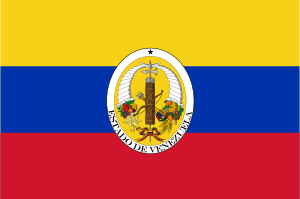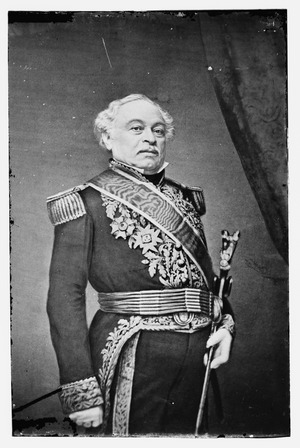Constitution of Venezuela (1830) facts for kids
Quick facts for kids {{{document_name}}} |
|
| Ratified | September 22, 1830 |
| Authors | Members of the Congreso de Valencia |
| Signers | 48 Members of Parliament |
| Purpose | To establish a federal center state under a republican, popular, representative, responsible and alternative system of government. |
The Constitution of Venezuela of 1830 was a very important set of rules for Venezuela. It was the main law of the country from 1830 to 1857. Think of a constitution as a rulebook for a country, explaining how the government works and what rights citizens have.
This constitution was approved by a special meeting called the Constituent Congress of Valencia on September 22, 1830. General José Antonio Páez officially announced it two days later. This Congress started its meetings in Valencia on May 6, 1830. There were 33 representatives from 12 different provinces of Venezuela.
This constitution was replaced in 1857. The time after 1830 was a bit chaotic in Venezuela. Many new constitutions were made, often to keep certain leaders in power. Events like the Revolution of the Reforms in 1836 and other political struggles show how much Venezuela was changing after gaining independence. The 1830 Congress aimed to organize the country's government into three main parts: the Legislative, Executive, and Judicial powers.
Contents
- What was in the Constitution?
- The Preamble: Why it was Made
- Title One: Venezuela's Land and Identity
- Title Two: How Venezuela was Governed
- Title Three: Who was Venezuelan?
- Title Four: What Venezuelans Had to Do
- Title Five: Who Had Political Rights?
- How Elections Worked
- The Legislative Body: Making Laws
- The Executive Body: Carrying Out Laws
- The Judicial Power: Ensuring Justice
- See also
What was in the Constitution?
The 1830 Constitution had a short introduction (called a Preamble) and 228 articles, which were grouped into 28 different sections called Titles.
The Preamble: Why it was Made
The Preamble is like an introduction that explains the goals of the constitution. It said:
Formed by the deputies of the Provinces of Cumaná, Barcelona, Margarita, Caracas, Carabobo, Coro, Maracaibo, Mérida, Barinas, Apure and Guayana.
In the name of Almighty God, author and supreme legislator of the universe.
We the Representatives of the People of Venezuela in Congress assembled, in order to form the most perfect union, establish justice, ensure domestic tranquility, provide for the common defense, promote general happiness, and secure the precious gift of liberty, for ourselves and our descendants, do ordain and establish the present Constitution:
This means the representatives wanted to create a strong country, ensure fairness, keep peace, protect the nation, make everyone happy, and keep freedom for themselves and future generations.
Title One: Venezuela's Land and Identity
This section talked about Venezuela as a nation and its land. It said that Venezuela's territory included all the land that was part of the Captaincy General of Venezuela before 1810. This idea is called Uti possidetis iuris, which means "as you possess, so you may possess." It meant Venezuela would keep the borders it had before it became independent. The country would be divided into Provinces, Cantons, and Parishes for better management.
Title Two: How Venezuela was Governed
This part explained that Venezuela would be a republic, meaning the people would have the power, usually through elected representatives. It also set up the three main branches of government:
- Legislative Power: This branch makes the laws.
- Executive Power: This branch carries out the laws.
- Judicial Power: This branch interprets the laws and ensures justice.
Title Three: Who was Venezuelan?
This section explained how someone could be a Venezuelan citizen, either by being born in the country or by becoming a citizen later (naturalization). It also mentioned that people who helped Venezuela gain independence could become citizens.
Title Four: What Venezuelans Had to Do
This short section explained the duties of citizens. It said that every Venezuelan had to follow the Constitution and laws, respect authorities, help pay for public services, and be ready to defend the country, even if it meant risking their property or life.
Title Five: Who Had Political Rights?
This section was about who could vote and hold public office. Not everyone had these rights. For example, to be a citizen with political rights, you had to:
- Be Venezuelan.
- Be married or at least 21 years old.
- Know how to read and write (though this rule wasn't immediately enforced).
- Own property or have a job that earned a certain amount of money each year. This meant poorer people or those who couldn't read and write often couldn't vote.
You could lose your rights if you:
- Became a citizen of another country.
- Worked for another government without permission.
- Fought against Venezuela.
- Were convicted of certain serious crimes.
This part of the Constitution didn't list many basic human rights, but focused more on who could participate in the government.
How Elections Worked
The Constitution set up a system for elections that was not direct. This means people didn't vote directly for the President or Senators. Instead, they voted for "Electors," who then voted for the higher officials.
Parish Assemblies: Local Voting
These were local meetings where citizens who had the right to vote would gather. They would elect "Electors" based on the population of their area. The local authorities would make a list of eligible voters and candidates.
To be an Elector, you needed to:
- Be a registered voter in the parish.
- Be at least 21 years old and know how to read and write.
- Live in the Canton.
- Own property or have a job that earned a higher amount of money than what was required for a regular voter.
Once the votes were counted, the person with the most votes became an Elector.
Electoral Colleges: Choosing Leaders
The Electors chosen in the Parish Assemblies would then meet in larger groups called Electoral Colleges. Their main job was to elect:
- The President of the State.
- The Vice President.
- Senators and their alternates.
- Representatives and their alternates.
- Members for Provincial Councils.

The Legislative Body: Making Laws
Legislative Power: The Congress
The power to make laws belonged to the Congress. The Congress had two parts:
- The House of Representatives (the lower chamber).
- The Senate (the upper chamber).
They met every year, starting on January 20, in the capital city.
The House of Representatives
Members of the House of Representatives were called Deputies. They served for four years. To be a Deputy, you needed to:
- Have the qualities of a voter.
- Be from or live in the province where you were elected.
- Have lived in Venezuela for at least two years before the election.
- Own property or have a job that earned a certain amount of money each year (more than what was required for an Elector).
The House of Representatives had powers like:
- Working with the Senate to create laws.
- Checking how the government spent money.
- Hearing accusations against top government officials like the President or judges.
The Chamber of Senators
Members of the Senate were called Senators. They also served for four years. To be a Senator, you needed to:
- Have the qualities of a voter.
- Be at least 30 years old.
- Be from or live in the province where you were elected.
- Have lived in Venezuela for at least three years before the election.
- Own property or have a job that earned an even higher amount of money each year than a Deputy.
The Senate's powers included:
- Working with the House of Representatives to create laws.
- Approving or rejecting the promotion of high-ranking military officers.
- Handling lawsuits started in the House of Representatives.
How Laws Were Made
Any new law could start in either the House of Representatives or the Senate. Once a proposed law was written and approved by both chambers, it was sent to the President to be officially announced and put into effect.
The Executive Body: Carrying Out Laws

Executive Branch: The President
The Executive Power was held by a single leader called the President of the Republic. Only Venezuelans born in the country could be President. They had to meet the same high requirements as a Senator. The President was elected by the Electoral College for a four-year term. They could not be re-elected immediately after their term ended.
There was also a Vice President, who was elected two years after the President. If both the President and Vice President were absent, another official would take their place.
The President had many important powers, such as:
- Keeping peace and order inside the country and protecting it from outside attacks.
- Making sure laws passed by Congress were carried out.
- Calling Congress to meet.
- Being the supreme commander of the army and navy.
- Declaring war (with Congress's approval).
- Handling international relations and signing treaties (with Congress's approval).
- Appointing government officials, including ministers and governors.
- Suspending or removing employees who broke laws or performed poorly.
- Making sure justice was served by the courts.
- Being able to reduce or change death sentences in some cases.
The President also had special powers during emergencies, like internal conflicts or foreign invasions, if Congress or the Council of Government agreed.
However, there were also limits on the President's power. The President could not:
- Leave Venezuela while in office or for one year after.
- Lead the army or navy in person without Congress's permission.
- Use the army to stop internal conflicts without the Council of Government's permission.
- Allow foreigners to become high-ranking military officers without Congress's permission.
- Expel Venezuelans from the country or take away their freedom (except in very specific cases).
- Stop court cases or prevent elections.
- Dissolve Congress or stop its meetings.
The Judicial Power: Ensuring Justice
The highest court was the Supreme Court of Justice. Below it were Superior Courts in different judicial districts, and other local courts. Their job was to make sure laws were followed and justice was administered fairly.
See also
 In Spanish: Constitución de Venezuela de 1830 para niños
In Spanish: Constitución de Venezuela de 1830 para niños
 | George Robert Carruthers |
 | Patricia Bath |
 | Jan Ernst Matzeliger |
 | Alexander Miles |

